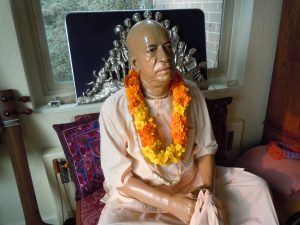Madhya 19.154–“Being situated in one’s heart and being watered by śravaṇa-kīrtana, the bhakti creeper grows more and more. In this way it attains the shelter of the desire tree of the lotus feet of Kṛṣṇa, who is eternally situated in the planet known as Goloka Vṛndāvana in the topmost region of the spiritual sky.
Madhya 19.155-“The creeper greatly expands in the Goloka Vṛndāvana planet, and there it produces the fruit of love for Kṛṣṇa. Although remaining in the material world, the gardener regularly sprinkles the creeper with the water of hearing and chanting.
Madhya 19.156-“If the devotee commits an offense at the feet of a Vaiṣṇava while cultivating the creeper of devotional service in the material world, his offense is compared to a mad elephant that uproots the creeper and breaks it. In this way the leaves of the creeper are dried up.
(Note-one can make offenses against Srila Prabhupada simply by disobedience or against ordinary devotees in various ways-either way the bhakti lata becomes disturbed)
PURPORT
One’s devotional attitude increases in the association of a Vaiṣṇava. tāṅdera caraṇa sevi bhakta-sane vāsa janame janame haya, ei abhilāṣa
By his personal example, Narottama dāsa Ṭhākura stresses that a devotee must always remember to please his predecessor ācārya. The Gosvāmīs are represented by one’s spiritual master. One cannot be an ācārya (spiritual master) without following strictly in the disciplic succession of the ācāryas. One who is actually serious in advancing in devotional service should desire only to satisfy the previous ācāryas. Ei chaya gosāñi yāra, mui tāra dāsa. One should always think of oneself as a servant of the servant of the ācāryas, and thinking this, one should live in the society of Vaiṣṇavas. However, if one thinks that he has become very mature and can live separate from the association of Vaiṣṇavas and thus gives up all the regulative principles due to offending a Vaiṣṇava, one’s position becomes very dangerous. Offenses against the holy name are explained in Ādi-līlā (Chapter Eight, verse 24). Giving up the regulative principles and living according to one’s whims are compared to a mad elephant, which by force uproots the bhakti-latā and breaks it to pieces. In this way the bhakti-latā shrivels up. Such an offense is especially created when one disobeys the instructions of the spiritual master. This is called guru-avajñā. The devotee must therefore be very careful not to commit offenses against the spiritual master. As soon as one is deviated from the spiritual master, the uprooting of the bhakti-latā begins, and gradually all the leaves dry up.
Madhya 19.157-“The gardener must defend the creeper by fencing it all around so that the powerful elephant of offenses may not enter.
PURPORT
While the bhakti-latā creeper is growing, the devotee must protect it by fencing it all around. The neophyte devotee must be protected by being surrounded by pure devotees. In this way he will not give the maddened elephant a chance to uproot his bhakti-latā creeper. When one associates with nondevotees, the maddened elephant is set loose. Śrī Caitanya Mahāprabhu has said: asat-saṅga-tyāga,-ei vaiṣṇava-ācāra. The first business of a Vaiṣṇava is to give up the company of nondevotees. A so-called mature devotee, however, commits a great offense by giving up the company of pure devotees. The living entity is a social animal, and if one gives up the society of pure devotees, he must associate with nondevotees (asat-saṅga). By contacting nondevotees and engaging in nondevotional activities, a so-called mature devotee will fall victim to the mad elephant offense. Whatever growth has taken place is quickly uprooted by such an offense. One should therefore be very careful to defend the creeper by fencing it in-that is, by following the regulative principles and associating with pure devotees.
If one thinks that there are many pseudo devotees or nondevotees in the Kṛṣṇa Consciousness Society, one can keep direct company with the spiritual master, and if there is any doubt, one should consult the spiritual master. However, unless one follows the spiritual master’s instructions and the regulative principles governing chanting and hearing the holy name of the Lord, one cannot become a pure devotee. By one’s mental concoctions, one falls down. By associating with nondevotees, one breaks the regulative principles and is thereby lost. In the Upadeśāmṛta of Śrīla Rūpa Gosvāmī, it is said:
“One’s devotional service is spoiled when he becomes too entangled in the following six activities: (1) eating more than necessary or collecting more funds than required, (2) overendeavoring for mundane things that are very difficult to attain, (3) talking unnecessarily about mundane subject matters, (4) practicing the scriptural rules and regulations only for the sake of following them and not for the sake of spiritual advancement, or rejecting the rules and regulations of the scriptures and working independently or whimsically, (5) associating with worldly-minded persons who are not interested in Kṛṣṇa consciousness, and (6) being greedy for mundane achievements.”
Madhya 19.158-“Sometimes unwanted creepers, such as the creepers of desires for material enjoyment and liberation from the material world, grow along with the creeper of devotional service. The varieties of such unwanted creepers are unlimited.
Madhya 19.159-“Some unnecessary creepers growing with the bhakti creeper are the creepers of behavior unacceptable for those trying to attain perfection, diplomatic behavior, animal killing, mundane profiteering, mundane adoration and mundane importance. All these are unwanted creepers.
PURPORT
There is a certain pattern of behavior prescribed for those actually trying to become perfect. In our Kṛṣṇa consciousness movement we advise our students not to eat meat, not to gamble, not to engage in illicit sex and not to indulge in intoxication. People who indulge in these activities can never become perfect; therefore these regulative principles are for those interested in becoming perfect and going back to Godhead. Kuṭīnāṭī, or diplomatic behavior, cannot satisfy the ātmā, the soul. It cannot even satisfy the body or the mind. The culprit mind is always suspicious; therefore our dealings should always be straightforward and approved by Vedic authorities. If we treat people diplomatically or duplicitously, our spiritual advancement is obstructed.
...There are many religious propagandists who do not know how the ultimate problems of life can be solved, and they also try to educate people in a form of sense gratification. This is also jīva-hiṁsana. Real knowledge is not given, and religionists mislead the general populace. As far as material profits are concerned, one should know that whatever material profit one has must be abandoned at the time of death. Unfortunately people do not know that there is life after death; therefore mundane people waste their time amassing material profit which has to be left behind at the time of death. Such profit has no eternal benefit. Similarly, adoration by mundane people is valueless because after death one has to accept another body. Material adoration and title are decorations that cannot be carried over to the next body. In the next life, everything is forgotten.
All these obstructions have been described in this verse as unwanted creepers. They simply present obstacles for the real creeper, bhakti-latā-bīja. One should be very careful to avoid all these unwanted things. Sometimes these unwanted creepers look exactly like the bhakti-latā creeper. They appear to be of the same size and the same species when they are packed together with the bhakti-latā creeper, but in spite of this, the creepers are called upaśākhā. A pure devotee can distinguish between the bhakti-latā creeper and a mundane creeper, and he is very alert to distinguish them and keep them separate.
Madhya 19.160-“If one does not distinguish between the bhakti-latā creeper and the other creepers, the sprinkling of water is misused because the other creepers are nourished while the bhakti-latā creeper is curtailed.
PURPORT
If one chants the Hare Kṛṣṇa mantra while committing offenses, these unwanted creepers will grow. One should not take advantage of chanting the Hare Kṛṣṇa mantra for some material profit. As mentioned in verse 159: The unwanted creepers have been described by Śrīla Bhaktisiddhānta Sarasvatī Ṭhākura. He states that if one hears and chants without trying to give up offenses, one becomes materially attached to sense gratification. One may also desire freedom from material bondage like the Māyāvādīs, or one may become attached to the yoga-siddhis and desire wonderful yogic powers. If one is attached to wonderful material activities, one is called siddhi-lobhī, greedy for material perfection. One may also be victimized by diplomatic or crooked behavior, or one may associate with women for illicit sex. Others may make a show of devotional service like the prākṛta-sahajiyās, or one may try to support his philosophy by joining some caste or identifying himself with a certain dynasty, claiming a monopoly on spiritual advancement. Thus with the support of family tradition, one may become a pseudo guru or so-called spiritual master. One may become attached to the four sinful activities-illicit sex, intoxication, gambling and meat eating, or one may consider a Vaiṣṇava to belong to a mundane caste or creed. One may think, “This is a Hindu Vaiṣṇava, and this is a European Vaiṣṇava. A European Vaiṣṇava is not allowed to enter the temples.” In other words, one may consider Vaiṣṇavas in terms of birth, thinking one a brāhmaṇa Vaiṣṇava, a śūdra Vaiṣṇava, a mleccha Vaiṣṇava and so on. One may also try to carry out a professional business while chanting the Hare Kṛṣṇa mantra or reading Śrīmad-Bhāgavatam, or one may try to increase his monetary strength by illegal means. One may also try to be a cheap Vaiṣṇava by chanting in a secluded place for material adoration, or one may desire mundane reputation by making compromises with nondevotees, compromising one’s philosophy or spiritual life, or one may become a supporter of a hereditary caste system. All these are pitfalls of personal sense gratification. Just to cheat some innocent people, one makes a show of advanced spiritual life and becomes known as a sādhu, mahātmā or religious person. All this means that the so-called devotee has become victimized by all these unwanted creepers and that the real creeper of bhakti-latā-bīja has been stunted.
Madhya 19.161″As soon as an intelligent devotee sees an unwanted creeper growing beside the original creeper, he must cut it down instantly. Then the real creeper of bhakti-latā-bīja grows nicely, returns home, back to Godhead, and seeks shelter under the lotus feet of Kṛṣṇa.
PURPORT
If one is misled by unwanted creepers and is victimized, he cannot make progress back to Godhead. Rather, he remains within the material world and engages in activities having nothing to do with pure devotional service. Such a person may be elevated to the higher planetary systems, but because he remains within the material world, he is subjected to the threefold material miseries.
Madhya 19.162-“When the fruit of devotional service becomes ripe and falls down, the gardener tastes the fruit and thus takes advantage of the creeper and reaches the desire tree of the lotus feet of Kṛṣṇa in Goloka Vṛndāvana.
Madhya 19.163-“There the devotee serves the lotus feet of the Lord, which are compared to a wish-fulfilling tree. With great bliss he tastes the juice of the fruit of love and becomes eternally happy.
PURPORT-The word tāhāṅ indicates that in the spiritual world one can taste the juice of the fruit of devotional service and thus become blissful.



